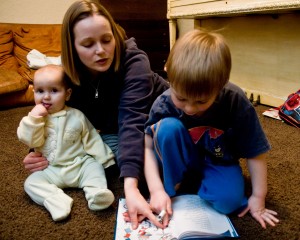
Helicopter parenting is exactly what it sounds like: hovering.
Helicopter parents are defined as parents who are over-involved and overbearing in the majority of aspects of their children’s lives, such as school, relationships, behaviors and so on.
Today’s society holds different opinions regarding how parents should raise their children. Many parents choose to control every decision, action and thought of their childlren in hopes of raising them correctly. Even though the parents’ intentions are good, this parenting style can have a negative effect on the children.
“I’ve yet to see a normal kid come from severely controlling parents,” said Nikki Dunnicliff, a full-time substitute teacher in the Murrieta Valley Unified School District in California. “The overprotective and overpowering parents try to control their kids both in and outside of the classroom. Many don’t realize how deeply they’re affecting their kid, and then they become defensive and in denial when their kid isn’t excelling in school.”
Dunnicliff frequently works with helicopter parents in a school setting and has come to see both the social and academic effects that helicopter parents have on their children.
In an ongoing nationwide study that began in 2007, hundreds of people were interviewed on 150 different college campuses. Researcher Jim Settle found that 60 percent of college students have at least one helicopter parent, a trend that concerns some who worry about the children’s development.
“It has been found that helicopter parenting is associated with negative aspects of emerging adults’ development, including more pessimistic views of marriage, (indications) of anxiety, depression and lower life satisfaction and psychological well-being,” BYU School of Family Life professor Larry J. Nelson said in a recent study.
Helicopter parenting has not been found to cause drug use in the children affected, but many of those who suffer from drug abuse do have issues with over-controlling parents.
“A lot of the time, residents’ parents are overbearing and don’t know how to set boundaries,” said Cirque Lodge rehabilitation center frontline tech Madison Swanson. “They expect their kid to make good choices, but they hover over their every move. Many adults here have parents that do not support them in their decisions but still try to control them in every shape, way or form.”
A lot of children rebel because they feel that they are kept on too tight of a leash, Swanson said.
Nelson also said research has shown that overbearing parenting correlates with the children’s sense of self-worth and the likelihood that they will act out in risky behavior.
Special education teacher’s assistant Susan Gull said she has seen how constant parental hovering can affect younger children’s abilities to internally cope and react to stressful situations. “I see a lot of parents who don’t think their kids can do certain things, so they baby them,” she said. “Sometimes, you have to learn to push them. There has to be a balance of knowing what they truly cannot do on their own and helping them to try to be more independent.”
Gull sees from a teacher’s point of view but also from a parent’s point of view. She has raised four children and said she has noticed that the behavior of her kids’ friends is different when they have over-controlling parents. “When the parents aren’t around, the kids get overly excited and don’t know how to react to certain things because they don’t have someone giving them constant instructions,” she said. “Many times, these kids become out of control and aggressive.”
Whitney Brinton is a mother of three young children. Her youngest son, Grey, is 4 years old and struggles with speech and pronunciation. Grey meets weekly with a speech pathologist, along with many other kids his age.
Brinton has grown to know the other parents well and said she believes that the children who have helicopter parents are usually the ones in the group who do not show a desire to learn.
“Many parents will translate for their kids because it’s easier and they don’t want their child to feel misunderstood,” she said. “But in the end, you’re doing a disservice to your child by never pushing them to step out of their comfort zone and try talking.”
Dunnicliff said she has seen many of her students fall behind in class because of their parents’ need to constantly control the situation. “I have one little girl in my class that has an extremely overbearing mom,” she said. “She holds her hand and walks her into class every day and won’t leave until about 10 minutes after class has started. She is always on the teachers’ backs about the lessons, when she has no idea the reason or educational construct behind each method.”
She said it is obvious that the daughter sees her mom as controlling and frequently gets embarrassed and seems to shut down. And when the mother is gone, it seems the daughter dramatizes situations because she doesn’t know how to handle her emotions without her mother or someone telling her how to feel or act.
The trend does not end with childhood. In further research, Nelson studied how detrimental it could be for emerging adults to not step away from their parents and invest their time in developing themselves to become independent in areas such as relationships, work and social skills.
“By not doing so (learning to be independent), emerging adults may be robbing themselves of the experiences and practice necessary to develop skills that are essential for success in marriage, careers and adult social interactions,” Nelson said.




